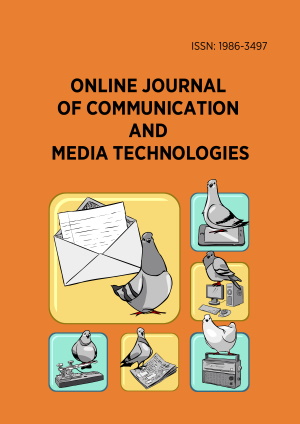Research Article
Representation of Emotional Modality in the Materials of English, Russian and Tatar Media
More Detail
1 Kazan Federal University, RUSSIA* Corresponding Author
Online Journal of Communication and Media Technologies, 9(4), October 2019, e201929, https://doi.org/10.29333/ojcmt/6275
OPEN ACCESS 3211 Views 1577 Downloads
ABSTRACT
The relevance of this research is closely bound with the general tendency of linguistics in the attempt to reveal the human factor in the language, as the most valuable results of the research are found in comparison of the languages. The goal of this article is to find out the common features and differences in covering the problems of refugees by the journalists in English, Russian and Tatar. The main approach of the research is interdisciplinary which requires the usage of such sciences as Sociology, Journalism and Linguistics. The article deals with the issue of objective (hidden) and subjective (open) emotional modality of the authors of the periodicals of three genetically unrelated languages. Authors consider metaphors as a way of expressing emotional modality and feelings towards the problem of refugees in the world.
CITATION (APA)
Akhmetzyanov, I. G., Mullagaliev, N. K., & Garaeva, A. K. (2019). Representation of Emotional Modality in the Materials of English, Russian and Tatar Media. Online Journal of Communication and Media Technologies, 9(4), e201929. https://doi.org/10.29333/ojcmt/6275
REFERENCES
- Bybee, J. L., Perkins, R. D., & Pagliuca, W. (1994). The evolution of grammar: Tense, Aspect, and Modality in the languages of the world. Chicago: University of Chicago Press.
- Chudinov, A. P. (2001). Rossiya v metaforicheskom zerkale: Kognitivnoe issledovanie politicheskoj metafory [Russia in a metaphoric mirror: cognitive investigation into politic metaphors]. Еkaterinburg: Ural. gos. ped. un-t.
- Collins, P. (2009). Modals and Quasimodals in English. Amsterdam: Rodopi. https://doi.org/10.1163/9789042029095
- Dobrosklonskaya, T. G. (2005). Voprosy izucheniya mediatekstov (opyt issledovaniya sovremennoj anglijskoj mediarechi) [Questions of investigating media texts (the experience of studying modern English media)]. Izd. 2-e, stereotipnoe. Еditorial URSS.
- Fachinetti, R., Palmer, F., & Krug, M. (2006). Modality in Contemporary English. W. Frawley, E. Eschenroeder, S. Mills, Th. Nguyen. Berlin : Walter de Gruyter.
- Mullagaliev N. K. (2016). Modal’nost’ hudozhestvennogo teksta: (na materiale anglijskogo i tatarskogo yazykov). [Fiction modality: based on the English and Tatar languages]. Kazan.
- Palmer F. R. (1979). Modality and the English Modals. London, New York: Longman.
- Romanova, T. V. (2008). Modal’nost’. Ocenka. Emocional’nost’. [Modality. Evaluating. Emotionality]. Nizhnij Novgorod: NGLU im. N.A. Dobrolyubova.
- Vinogradov, S. I. (1994). Vyrazitel’nye sredstva v parlamentskoj rechi [Tekst]. Kul’tura parlamentskoj rechi. Nauka, 66-77.
- Volodina, M. N. (2008). Yazyk SMI – osnovnoe sredstvo vozdejstviya na massovoe soznanie [Mass media language as the basic tool of mass manipulation]. YAzyk sredstv massovoj informacii: ucheb. posobie dlya vuzov. pod red. M.N. Volodinoj. Akademicheskij Proekt; Al’ma Mater, 6-24.

 The articles published in this journal are licensed under the CC-BY Creative Commons Attribution International License.
The articles published in this journal are licensed under the CC-BY Creative Commons Attribution International License.